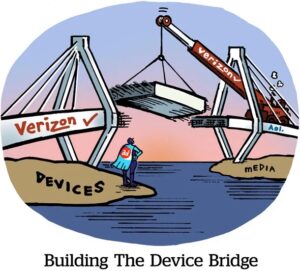Here’s today’s AdExchanger.com news round-up… Want it by email? Sign up here.
Paramount’s Dilemma
Paramount Global has finally agreed to merge with Skydance Media – but it’s not out of the woods yet. Even if the deal closes, the multibillion-dollar cash infusion may not be enough to help Paramount compete in the streaming wars, Ad Age reports.
What Paramount needs is more scale to compete with media and tech behemoths like Amazon, Google, Disney and NBCUniversal. Upfront negotiations are a blaring reminder that advertisers put their biggest spend commitments behind the largest content portfolios.
“New Paramount,” as it’s being called by the new leadership, plans to generate scale by licensing more of its content to other (yet to be named) platforms and distributors. Licensing is a popular strategy among broadcasters to milk more revenue from their content by expanding its reach.
The problem is that this tactic is often confusing for viewers and can result in churn. Licensing doesn’t “create a habit among consumers to subscribe and stay subscribed” to a service, says industry analyst Brian Wieser. Why pay for a Paramount+ membership when you can find the same shows on, say, Netflix or Prime Video?
Never Let YouTube Go
Needham & Company investment analysts Laura Martin and Dan Medina released a report this week placing a $455 billion valuation on YouTube – compared to Netflix ($292 billion) and Disney (a mere $176 billion).
YouTube is a “giant hiding in plain sight,” as Bloomberg puts it, partly because Google (ahem, Alphabet) has a deliberately labyrinthine structure.
Martin contends Alphabet would be better served liberating YouTube – perhaps not from its strategic alignment with Google advertising, but at least by making it a separate entity.
“There is this hidden value in YouTube that people can’t separately trade, and so it’s trapped in Google in a conglomerate that has a lot of other risks,” she tells Bloomberg. Why, for example, should YouTube be burdened by the AI-related headwinds facing Google Search?
On the other hand, it’s hard to disentangle YouTube’s immense ad revenue from Google, considering Google’s DV360 DSP has exclusive access to the inventory and YouTube campaigns are deeply infused with search data. Not to mention products like Performance Max that don’t distinguish between Search, Gmail or YouTube, including YouTube TV and Shorts.
But don’t hold your breath, by the way. Google would ditch its ad tech stack long before even contemplating a YouTube spinoff.
Pro Gamer Strats
Eric Seufert’s latest Mobile Dev Memo piece poses an interesting question about the future of mobile advertising networks: Will they ever attract other types of clients beyond games?
Ever since Apple started requiring developers to get an opt-in for in-app tracking, it’s become significantly harder to target free-to-play mobile game users for anything beyond other mobile games (and often misleading ones at that).
Meanwhile, the gaming category is extremely broad – there are so many different genres under the “gaming” umbrella – and clicks and impressions don’t often correlate with user engagement.
So it’s no surprise that securing non-gaming brands at scale has proven difficult for most ad networks.
But despite all these setbacks, mobile-gaming-focused companies like ironSource and AppLovin are keen to expand into nongaming verticals. If they can figure out how to provide consistent value for nongaming advertisers, they’d be on track not just to increase their own revenue but to significantly disrupt the market as a whole.
But Wait, There’s More!
Microsoft leaves OpenAI’s board amid antitrust scrutiny. [WSJ]
Why Snap could be more cost effective for brands than TikTok and Meta. [Business Insider]
Temu plans to start shipping products directly from US warehouses – its latest attempt to compete with Amazon. [The Information]
CNN will launch a new streaming subscription service by the end of the year. [Variety]
Snopes released an AI product for fact-checking. [release]
You’re Hired!
Mike Merna joins Yahoo as senior director for commerce media. [post]
The Weather Channel hires D.J. Reali as CRO. [release]
Adlook appoints industry vet Jim Daily as executive advisor. [release]
Imagine Communications names Don Durand SVP of global sales for its ad tech business. [TVTechnology]

















